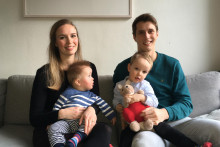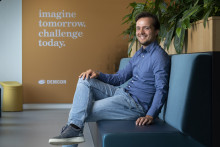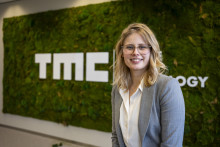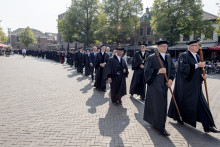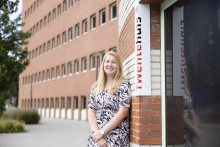The couple is remarkably in sync. Not only did they choose the same programme, which they studied and finished at the same time (‘Anne got 10 out of 10 for her thesis, though,’ remarks Lex), they are both currently completing their PhD thesis. There is one small difference there. While Lex worked on his doctorate as a part-time researcher and lecturer at the UT, Anne will get her PhD from the Amsterdam UMC.
‘And we’ve had two kids in between,’ reminds me Anne. Flip is two and half years old and his younger sibling Oliver is eight months. ‘It is really nice and convenient to be so synchronized,’ admits the UT alumna. It allows them to embark on their adventure ‘Down Under’, to Canberra where they are moving in March.
phd researchers
Lex van Loon is a PhD candidate and a lecturer at the Technical Medical Centre at University of Twente. He focuses on methods to guide and predict volume therapy in critically ill patients and will defend his doctoral thesis on the 12th of February 2020.
Anne Steins graduated Technical Medicine at the UT in 2013, just like her husband. In her Master thesis she studied spider silk for uses in reconstructive medicine. She is now a PhD candidate at the department of Medical Oncology, AMC. Her research is on the role of the tumor microenvironment in tumors of the upper gastrointestinal tract.
You both got jobs in the same group at the Australian National University. How did this happen?
Lex: ‘We were thinking of what to do after finishing our PhDs and going abroad was on top of our list.’
Anne: ‘Not going abroad for our career, though! We didn’t want that.’
Lex: ‘Yes, we thought of South America, maybe Brazil, doing some voluntary work. It didn’t work out that way. I asked a colleague at the UT if he knew anybody living abroad. I was thinking something like Italy. I imagined myself sitting in the sun, drinking wine, eating pizza… and the colleague first came up with a group in Singapore and then Australia. My first reaction was “no way! That is on the other side of the world”.’
Anne: ‘And it would be a move for career. We’d actually have to work. But eventually we decided to go for it. We dive into the deep. We do that with a lot of things. We tend to take on big projects and so far it has always worked out well. We figured: if we can both get meaningful jobs, it’s a sign.’
And you both immediately got job offers?
Anne: ‘It’s like it was meant to be!’
Lex: ‘Yes, at the Medical School of the Australian National University. The faculty has a new dean who has visited the UT. He fell in love with the Technical Medicine programme and was now looking for people who studied it, so they could help implement the Technical Medicine approach over there. We will not be starting a Technical Medicine programme there, at least not yet, but we will help bring the medicine and engineering programmes closer together.’
You will also be doing research into space medicine. What exactly does that entail?
Lex: ‘The field focuses on what happens to the human body in outer space. We will be working in one group studying space physiology.’
Anne: ‘Lex will focus on the cardiovascular system and I will study molecular changes that happen in our body in space. For example, many astronauts have eye problems after returning from space. We’d like to see what causes this, by looking at what happens to the eye on a molecular level. Because space flights will soon be commercialized and if everybody comes back blind, then we have a problem.’
Lex: ‘Exactly. We sort of know what happens to fit astronauts, but space travel will not be restricted to super fit astronauts for much longer. They are even thinking of using rockets to travel from Australia to Europe. It would take only two hours then! That would be good for us. If they could speed that up, my mother would be very happy.’
What excites you about this field?
Lex: ‘When we started studying Technical Medicine, it was an undiscovered field. There was so much to explore. And I have the same feeling about this job.’
Anne: ‘I studied spider silk – which is strange, a bit crazy and exotic. This field seems the same. It is a bit crazy but so much fun. And it can have a big impact if we do it well.’
How are you feeling about the big move?
Lex: ‘Stressed.’
Anne: ‘Anxious. There is so much to arrange and we both have to defend our PhD thesis soon. But we are also excited and looking forward to discovering new places. We have signed up the kids for daycare already last year, but we don’t have any housing yet. I don’t think we will do a lot of packing. We can’t bring that much.’
Lex: ‘Only absolute necessities. So diapers and kids.’
Are you planning to stay in Australia?
Anne: ‘The jobs are for three years. A lot of people say that we will never come back, but we don’t believe that. We will definitely come back.’
What a story you two have!
Anne: ‘Let’s hope it ends well.’


